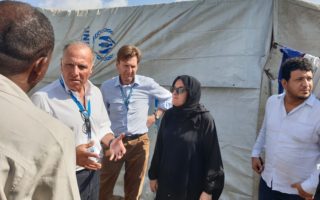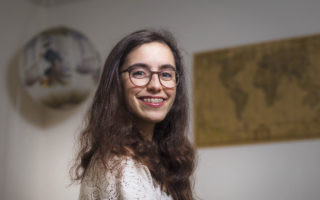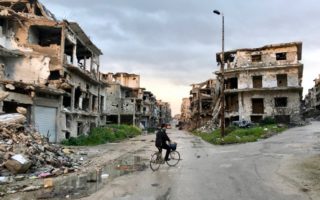We want to take a moment to thank and honour humanitarians everywhere. From our amazing supporters to UNHCR staff around the world, who’ve dedicated their lives to improving those of others.
UNHCR is present in 134 countries worldwide. From providing assistance to families who’ve just fled Venezuela to responding to the needs of those affected by the crisis in Syria, we do whatever it takes to help protect people forced to flee their homes. Meet Yumiko Takashima, an incredible person on our team, who gave us a snapshot of her life as an aid worker.
Yumiko’s work is only possible because of our supporters worldwide. You can help us continue our important work and reach even more families in need by donating today: https://give.unhcr.ca
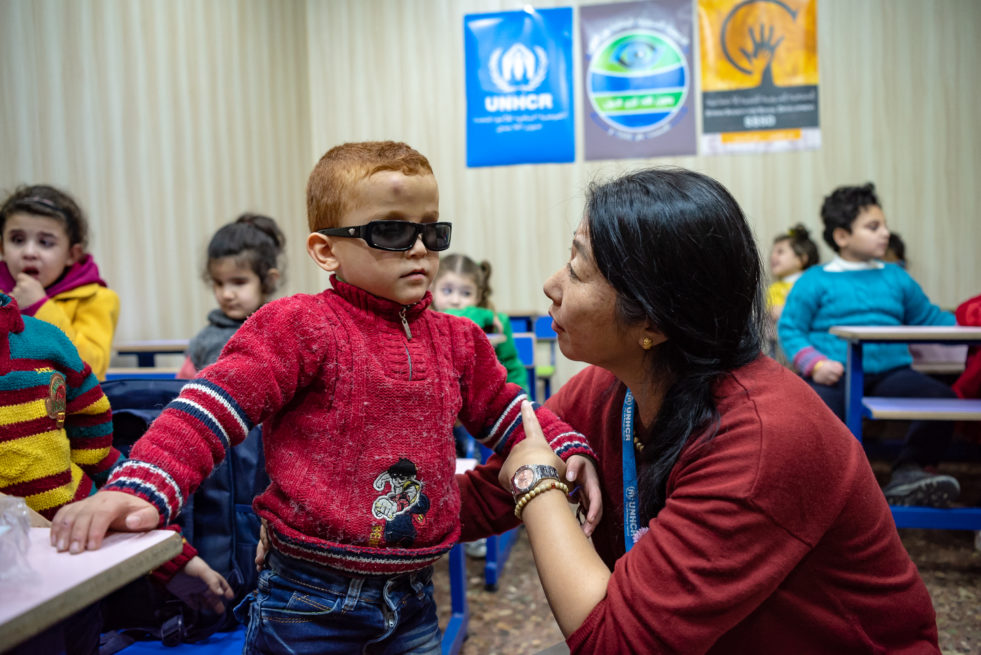
UNHCR’s Head of Sub-Office in Aleppo, Takashima Yumiko, helps Subhi, a seven-year-old who is visually impaired, at a centre for the prevention of blindness in the Sabil neighbourhood of Aleppo. © UNHCR/Antwan Chnkdji
Yumiko Takashima is the Head of Office for UNHCR’s office in Aleppo, Syria’s second largest city – over 8,700 kilometres away from her native Tokyo. Yumiko joined UNHCR twenty years ago and has worked in East Timor, Sudan, Thailand, Afghanistan, Kenya, Uganda, Iran, Japan and now Syria. Stationed in Aleppo since September 2018, she tells us what it’s like to live and work in one of the most difficult places in the world, every single day.
5:00 a.m. My phone’s alarm clock rings and I drag myself out of bed to go jogging. Exercise is really important…especially in a city like Aleppo where the local food is so delicious! My newfound love is ‘Kabab bil Karaz’ (cherry kebab). Before the crisis, Aleppo used to be the economic hub of Syria and it was well known for its large covered market, traditional products such as soaps, and delicacies such as ‘Kebeh’ and ‘Mahashi’ (eggplant and zucchini filled with minced meat).
We currently have to live in a hotel because of the security situation, so I run a few laps in the small garden around the hotel. Life in a hotel isn’t as glamorous as it sounds and you quickly start missing what makes a place ‘home,’ like being able to cook and enjoy a meal in your own kitchen. But we try to make the best of it. Like creating a small kitchen in a common area, where we can cook..
8:00 a.m. After a quick breakfast, I’m in a car, ready to go to the office. It’s only a 10-minute drive away but we have to take a different route very day, for safety reasons. We drive in armoured vehicles anywhere we have to go. Half of Aleppo has been destroyed because of the crisis. The other half is intact. One street divides the two sides. If I stand in the middle of that road, I feel like I’m in a movie – one side being destroyed and the other intact – it is so unreal but it is real. The needs here are huge. More than 990,000 people in and around Aleppo have been forcibly displaced from their homes. Some 161,000 have since returned home. UNHCR is supporting families who choose to return with village support programmes aimed at improving the conditions when people do go back home. We estimate that there are about 1.4 million people in need in and around Aleppo. Behind each of these numbers, there are real people, with real lives.
“What amazes me is people’s resilience. People here have faced very difficult situations but they just want to move forward.”
That’s why I’m here: it’s about how we as humans can help each other. What amazes me is people’s resilience. What you may hear about Aleppo is not what it’s really like. People here have faced very difficult situations, but they don’t look back, they just want to move forward and have normalcy in their life. We as humanitarians can help our fellow human beings, who just happen to fall into crisis, to move on.
8:15 a.m. Once I get to work, I take 15 minutes to quietly go through what’s coming up that day, to prioritize work and think about how to deal with any difficult meetings. Those 15 minutes are very important to me, they help me focus. First up today is a team meeting. There are about 60 of us working here in Aleppo at the moment, including 52 national colleagues. Many have themselves lost family members and friends because of the crisis. Yet they keep going. I’m so honoured to be a part of such a strong, confident, passionate team.
11:00 a.m. I head out with my colleague Mustafa to visit a community centre run by UNHCR, to make sure our activities are on track. In these centres we offer different services like legal advice, counselling, job training and catch-up classes for children who’ve missed out on school because of the crisis. Children are the future of Syria and we want to make sure that they are not left behind.
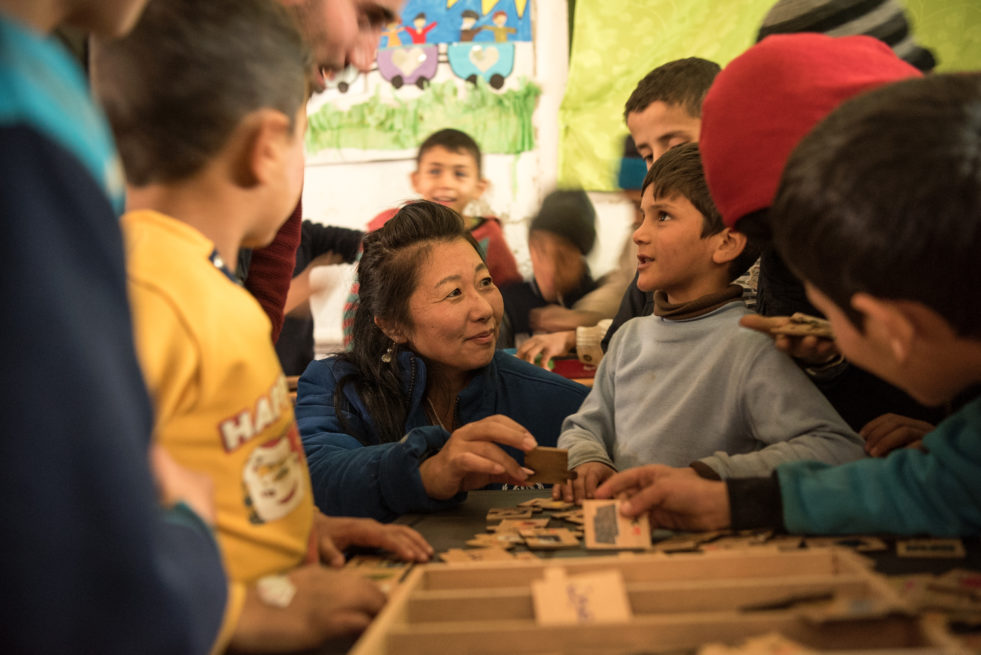
Muhammad tells UNHCR’s Head of Sub-Office in Aleppo, Takashima Yumiko, about the fun activities he does at the UNHCR-supported children’s centre in Dayr Hafer, rural Aleppo. © UNHCR/Hameed Maarouf
A community centre is more than just a building where people can access protection services and information. It’s a space where people meet and discuss what they want to do for themselves in their communities. Right now, UNHCR supports 22 community centres and 10 smaller satellite centres in Aleppo. We also have 28 mobile teams that go out to small, remote villages to make sure that families there receive the support they need. These teams consist of local outreach volunteers who know their communities best.
2:00 p.m. I meet with the staff of a national organisation that is helping UNHCR distribute winter supplies. We are still very much dealing with emergencies in various parts of Aleppo. We are there to help, to provide shelter and basic items like blankets, jerry cans for storing water and more. During winter it’s extremely cold here. That’s why we provide materials like clear plastic sheets to help families cover destroyed windows and doors, to keep out the cold. This winter, we’ve assisted over 215,000 people in the area with essential items like sleeping bags, winter jackets, blankets and plastic sheeting.
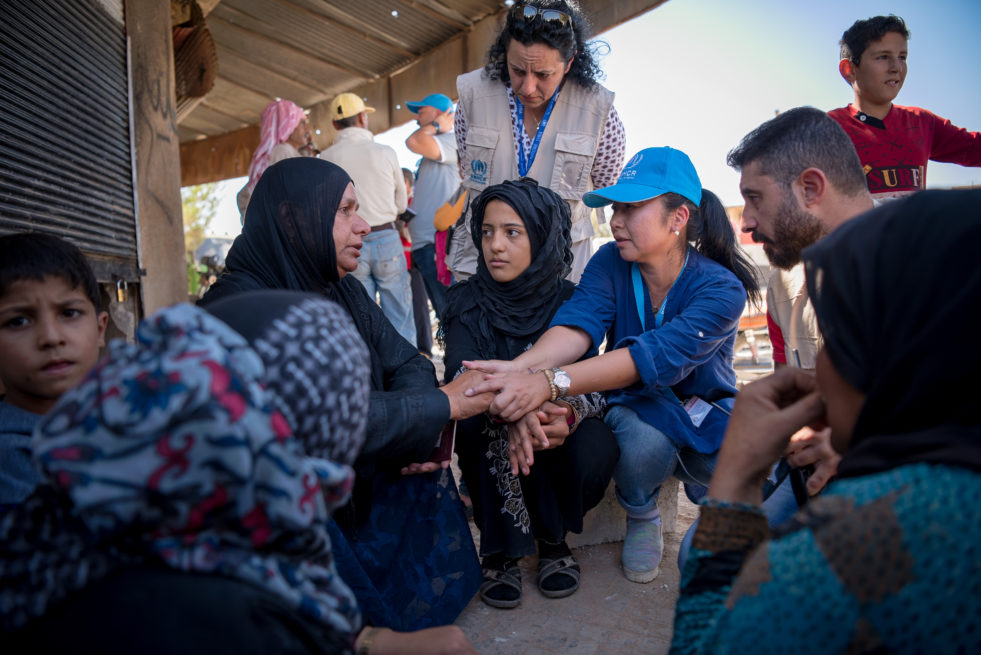
UNHCR’s Head of Sub-Office in Aleppo, Takashima Yumiko, comforts a mother in Rasem Alharmal, a small village in rural Aleppo with a pre-crisis population of 1,500 people. Around 1,000 have returned since fighting ended in April 2017. Most found their houses destroyed and looted. © UNHCR/Antwan Chnkdji
6:00 p.m. Most staff leave the office before it gets dark – for our safety. When I get back to the hotel, I continue working, answering emails and preparing for the next day, sometimes late into the night. If you asked me to describe this job, I would say that it’s not a job, it’s a vocation. It’s something I’m so lucky to be able to do. Even if it’s hard being away from my family and friends.
Many of us want to do something when we see someone suffering, as a fellow human being. We may not always be able to do as much as we want but even listening to people and showing that we care matters. We’re lucky to be able to do it here in Aleppo. I hope people don’t forget about the displaced families here who need help. They’re people like me and you, who just happen to be in this difficult situation, by no fault of their own. I know it’s so easy to forget what’s going in on the next town, country, continent. But I get to see what happens when you do help. People are strong. With a little support, they can go on with their lives.
A while ago, UNHCR helped install streets lights in one area of Aleppo. Lighting up the streets means life can go on after dark: people feel safer and can move around more easily, kids can do their homework in the evening, families don’t have to sit in the dark anymore. So it’s not just light, it’s the hope it provides for the people. When the lights went on, an old lady came out of her house and hugged me, crying and pointing her finger at the lights. She didn’t speak a word of English and my Arabic is terrible, but we didn’t need any words to understand each other. Times like that, I feel so privileged to be working in Aleppo.
Interview conducted in February 2019



